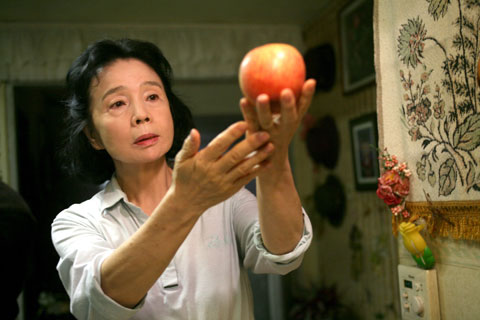
AGAINST ALL ODDS Lee posits the poetic sensibility as a means of transcending the brutishness his film depicts. |
Mija (Yun Jung-hee) is 60ish but still a looker, a quality she's aware of. She dresses elegantly even when she's going about her chores as a cleaning woman — which include bathing Mr. Kang (Kim Hi-ra), the elderly, paralyzed patriarch of the family who've hired her. But her sundresses and her big flouncy hats and her wistful, quizzical air all overcome such sordidness. She has a Blanche Dubois–like faded gentility.
What's more, she's determined to cultivate herself by taking a poetry class at the local culture center, where the assignment is to finish just one poem before the course ends. As she points out to random, disinterested listeners, she believes she has the makings of a poet because she likes flowers and says odd things. But lately, she's been forgetting words, and the tests she takes at the hospital indicate an early stage of dementia. Now the nouns are vanishing from her memory. Soon the verbs will follow.
Korean filmmaker Lee Chang-dong's subtle and moving picture, an elliptical narrative told from Mija's cryptic point of view, likewise features blanks and omissions. Its images are spare and elusive, like what remains of Mija's diminishing vocabulary. But her quiet compassion, her ability to see beyond crass surfaces, and her delicate beauty are, like her mental faculties, threatened with extinction — crushed or ignored by the coarse, violent, egocentric individuals who dominate her world.
Even with her faculties faltering, she's more sensitive than those around her. Maybe it's a generational thing. Her divorced, absent daughter, with whom she communicates only through one-sided cell-phone calls, has left mom in charge of her teenage son (Lee David). Wook's no prize — he's regressed beyond selfishness to a feral solipsism. Immersed in TV, the internet, and video games, he's ungrateful for his grandmother's doting servility and unresponsive to her mild suggestions. He has little use for language, let alone poetry, beyond grunting his needs, which his grandmother seems more than happy to oblige.
That is, until she learns that he and five schoolmates are responsible for a grotesque crime. The parents of the other boys want her to join them in raising money to get the culprits off the hook by paying off the victim's family.
Mija goes along, but not entirely. Her poetry distracts her. The cultural center's earnest, fatuous teacher enjoins his students to see things, to comprehend the sublimity in an apple, a basin of dishwater, or a bouquet of artificial flowers. Mija jots down her impressions in a notebook, composing in her long silences her one poem, which, perhaps without her knowing it, taps into her guilt and anger, and binds her closer and closer to the victim of her grandson's crime.